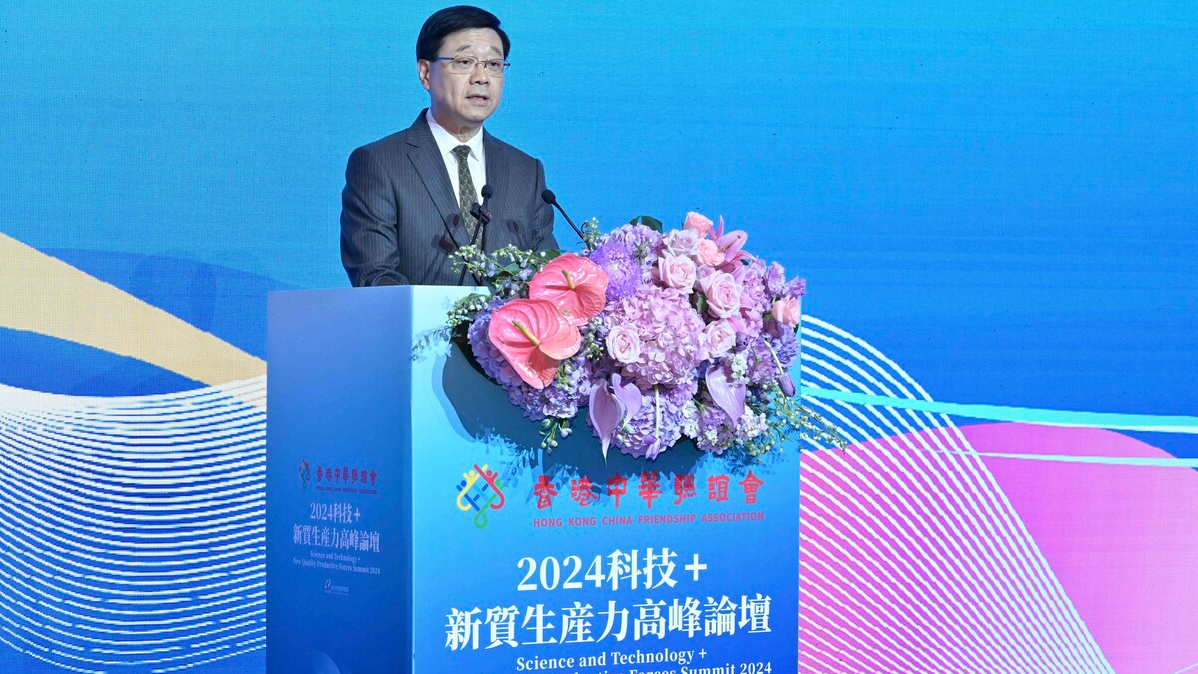
Officials said on Monday that Hong Kong should find a niche in developing new quality productive forces by tailoring technological applications to industrial needs amid the nation’s drive for an innovation-driven economy.
China last year brought new quality productive forces to the table as a key part of efforts to seek more innovative and eco-friendly growth drivers that could replace the old ones — in particular the floundering housing sector. Notable examples of these new forces include the electric vehicle supply chain, artificial intelligence, and advanced semiconductors.
Hong Kong Chief Executive John Lee Ka-chiu said developing new quality productive forces is part and parcel of driving technological innovation, enhancing industrial competitiveness, and advancing the new real economy.
READ MORE: Lee: HK to promote new productive forces for high-quality development
“To accelerate the development of new quality productive forces tailored to local conditions, all sectors in Hong Kong must leverage their own strengths and proactively engage in innovative transformations,” the city leader said in his opening speech at the Science and Technology + New Quality Productive Forces Summit 2024 held by Hong Kong China Friendship Association.
According to Lee, Hong Kong’s official push for new quality productive forces focuses on four aspects. These include fostering its emerging sectors, transforming traditional manufacturers, promoting research commercialization, and deepening its talent pool.
The country’s EV sector leads the charge in new quality productive forces driven by massive policy support and technological innovations. In the domestic market, the penetration rate of electric cars topped 50 percent for the first time in July, according to the China Passenger Car Association.
As a battery EV export behemoth, China leveraged the EV surge last year to surpass Japan as the world’s leading vehicle exporter. According to the American think tank Atlantic Council, China’s total battery EV exports skyrocketed 70 percent to $34.1 billion last year, with the European Union being the primary destination and representing almost 40 percent of these exports.
As for Hong Kong, the city’s flagship tourism sector is primed for innovation, said Zheng Yanxiong, director of the Liaison Office of the Central People’s Government in the Hong Kong Special Administrative Region.
More efforts are encouraged, such as leveraging the city’s coastline and integrating performing arts, e-sports, and AI with the travel experience to create a preferred leisure destination for over 500 million middle- and high-income individuals from the Chinese mainland.
According to the Hong Kong Tourism Board, the total number of tourists in the first half of 2024 rose 64 percent year-on-year to around 21 million. There were 16.1 million tourists from the mainland, up 60 percent from the same period a year earlier.
Zheng said Hong Kong’s strengths in finance and research provide advantages for developing new quality productive forces. Long seen as an international financial center, Hong Kong is also home to five universities that rank in the top 100 globally. “Finance and innovation and technology are intertwined,” he said, adding that the city has incubated some 4,200 startups.
READ MORE: Localized approach seen key for HK to foster new quality productive forces
Another tailwind is on the talent front, said the liaison office chief. In July, a quinquennial top-level policy meeting, highlighted the country’s support for Hong Kong to develop into an international hub for high-caliber talent.
According to the Hong Kong Unicorn Index Report 2024 released last week, the city boats 53 unicorns — a term that refers to a private company valued at over $1 billion. All these unicorn companies have a Hong Kong element, either with founders who are Hong Kong residents or who have studied or worked in local universities, or the companies were established in the city. Also, the companies on the list are operating in accordance with international standards and creating products that cater to global demand.
Secretary for Innovation, Technology, and Industry Sun Dong said in his speech that an international city like Hong Kong is bound to nurture world-class talent, and this list of companies reveals the unique role that Hong Kong plays in the national development strategy from a new perspective.
Contact the writer at evanliu@chinadailyhk.com



